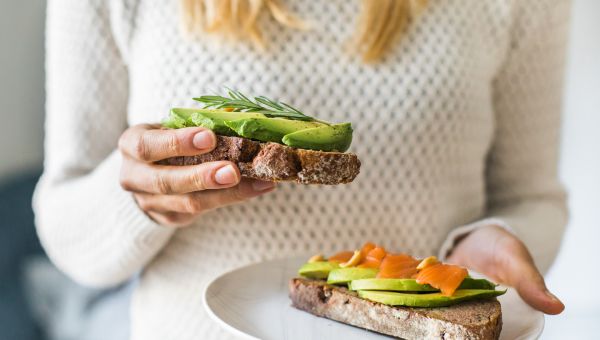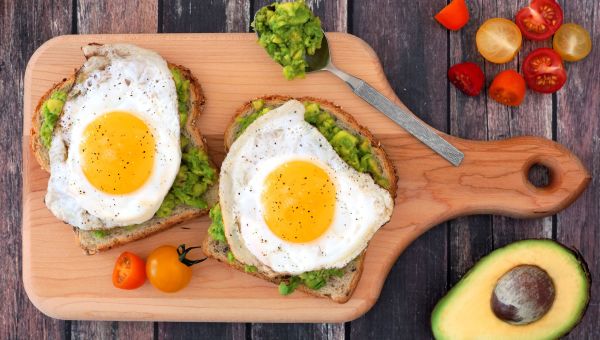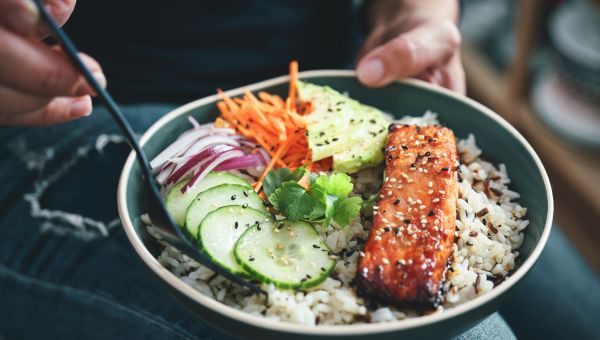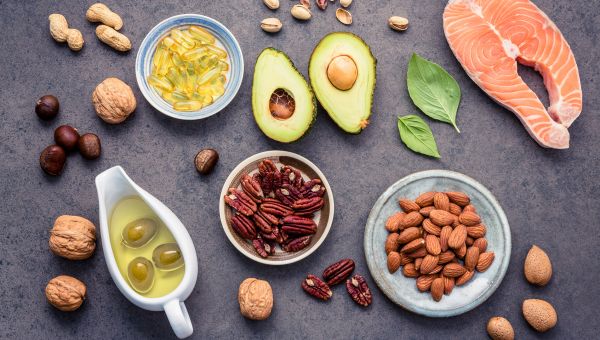Avoiding fat? 7 reasons you shouldn't
Eating the right kind of dietary fat can help you boost your memory, lower your cholesterol levels, and so much more.
Updated on September 14, 2022

In the wake of trendy diets that promote eating little to no fat, this essential nutrient has gotten a bad rap. But not all dietary fats are created equal. There are unhealthy kinds that should be limited or avoided altogether and healthy kinds that deserve a place at the dinner table. Our bodies rely on healthy fats to function well. Knowing which to choose can make a big difference in your overall well-being.
Saturated fats found in foods like beef, pork, and coconut oil are linked to high cholesterol, stroke, and heart disease. Trans fats have largely been phased out of food products in the United States, but they can still be found in certain processed and packaged foods like pastries, fried foods made with partially hydrogenated oils, and some frozen meals. Trans fats can raise levels of low-density lipoprotein (LDL, aka “bad” cholesterol), lower levels of high-density lipoprotein (HDL, aka “good” cholesterol), and increase your risk for type 2 diabetes.
What you want in your diet instead are unsaturated fats and omega-3 fatty acids, found primarily in plant products like nuts, olives and seeds, and in fish like salmon. Both polyunsaturated fats (like omega-3 fatty acids) and monounsaturated fats help lower cholesterol levels and boost heart health. Read on for more good reasons to eat healthy fats.

Healthy fats help lower cholesterol
Heart disease is the leading cause of death among American adults, with nearly 700,000 reported deaths in 2020. High levels of LDL are a leading risk factor for heart disease. Cholesterol levels are affected by several factors, including diet, weight, physical activity level, age, sex, and family history. Some factors are beyond your control, but many can be modified to help lower your heart disease risk.
A diet rich in saturated fats has been linked to higher levels of LDL. Research suggests that replacing saturated fats with unsaturated ones can lower your risk of heart disease, and it's not as hard as you think. Try replacing one serving of red meat each week with a piece of fatty fish, like salmon, tuna, trout, or herring.
“Unsaturated fats can help lower the bad cholesterol and increase good cholesterol levels,” says Frank Chae, MD, a bariatric surgeon with Sky Ridge Medical Center in Lone Tree, Colorado. “This helps lower the overall risk of heart disease and stroke.”

Unsaturated fats regulate hormones
Hormones are chemicals that work to aid various body functions and processes, from growth to sexual function to mood. These chemicals can be affected by age, stress, medical conditions, and even your diet.
When your hormones are out of whack, your body doesn’t function the way it should. Too much or too little fat in your diet could affect your hormone levels.
The typical Western diet, which tends to be high in saturated fat, may contribute to higher-than-normal levels of estrogen—the primary female sex hormone. Some research suggests may be linked to an increased risk of breast cancer.
For men, low-fat diets can negatively impact testosterone levels. Testosterone is the hormone responsible for male sex drive and physical characteristics, like bone and muscle mass.
What’s the right amount of fat? The 2020-2025 Dietary Guidelines for Americans recommends limiting your amount of saturated fats to less than 10 percent of daily calories. The previous version of the guidelines recommended keeping total fat consumption, from saturated and unsaturated fat, to under 30 percent. While the most recent version does not provide a recommended intake for unsaturated fats, it does encourage replacing saturated fats with unsaturated fats whenever possible.

Fat keeps you fuller, longer
When eaten in small portions, healthy fats may help you slim down because they keep you feeling fuller for longer.
If you’re looking to sate hunger, try snacking on a handful of nuts, like almonds or walnuts. Stick to one serving, which translates to about 23 almonds or 13 walnut halves.
Dr. Chae stresses the importance of moderation when it comes to eating foods high in fat. High-fat foods, even those containing healthy fats, are dense with calories.

Monounsaturated fat slows atherosclerosis
Atherosclerosis, characterized by the buildup of fatty plaque in the arteries, can result in heart, kidney, or peripheral artery disease. People who smoke, those with high cholesterol, or who have high blood pressure are at an elevated risk of developing atherosclerosis. Addressing those health problems can lower your risk.
Foods high in omega-3s and monounsaturated fats—like avocados, walnuts, macadamia nuts, pecans, and canola oil—can help lower cholesterol levels and decrease rates of heart disease.

Healthy fats boost vitamin absorption
We need a wide variety of vitamins and minerals to function properly. When our bodies can’t make these on their own, we can get them through foods and dietary supplements.
But there’s more to getting some vitamins, like vitamin E, than simply eating vitamin-rich foods. Vitamin E is a fat-soluble vitamin, which means it needs dietary fat for the body to absorb it most efficiently. Research shows that vitamin E is better absorbed when taken with a high-fat meal compared with a lower-fat meal. Because vitamin E is important for a healthy immune system, an inability to absorb the vitamin can lead to immune problems.
Vitamin E isn’t the only vitamin that relies on fat for absorption. Vitamins A, D, and K do, as well. A clinical trial published in the Journal of the Academy of Nutrition and Dietetics in 2015 found that dietary fat in a meal helped significantly improve the body’s ability to absorb vitamin D3, a nutrient necessary for bone health and proper lung function.

Omega-3 fatty acid sharpens your memory
Research suggests that omega-3s, the fatty acids found in fish, can help boost memory and improve cognition. A 2018 study published in the European Journal of Nutrition found that higher fatty fish consumption slowed decline in cognitive function and memory in a group of Dutch adults.
The American Heart Association recommends consuming at least two servings of fish each week. The Mediterranean diet, an eating plan endorsed by Chae and many other experts, recommends having 2 to 3 servings of fatty fish, like sardines and cod, a week. What else should be a part of your eating plan? “A Mediterranean diet consists of lean protein, with healthy fats, vegetables, fruit, and nuts with monounsaturated fats,” says Chae.

Fatty fish helps fight dementia
Healthy fats have even more brain-boosting benefits. Research suggests that consumption of omega-3 fatty acids, particularly a component called docosahexaenoic acid (DHA), can decrease your risk of developing Alzheimer’s disease. Alzheimer’s, the most common form of dementia, is a progressive condition that affects mental function, including language and memory. DHA is found in fatty fish like mackerel, herring, sardines, tuna, and salmon.

Healthy Ways to Add Fat to Your Diet
We know our bodies need healthy fats to thrive. Fortunately, there are many flavorful ways to enjoy your daily dose of healthy fats:
- Toss a tablespoon of chopped walnuts into your lunchtime salad. Add a drizzle of olive oil for an extra boost.
- Top your morning eggs with a few slices of ripe avocado.
- Sprinkle a tablespoon of chia seeds on nonfat plain Greek yogurt.
- Spice up your morning with maple walnut flaxseed pancakes.
- Try cooking a simple fish dish, like oven-roasted salmon recipe.
- Blend chia or hemp seeds into your favorite smoothie.

MedlinePlus. Facts about saturated fats. National Library of Medicine. Last reviewed May 26, 2020. Accessed August 6, 2022.
MedlinePlus. Facts about trans fats. National Library of Medicine. Last reviewed May 26, 2020. Accessed August 6, 2022.
Food and Drug Administration. Trans fat. Accessed August 6, 2022.
MedlinePlus. Facts about monounsaturated fats. National Library of Medicine. Last reviewed May 26, 2020. Accessed August 6, 2022.
MedlinePlus. Facts about polyunsaturated fats. National Library of Medicine. Last reviewed May 26, 2020. Accessed August 6, 2022.
Centers for Disease Control and Prevention. Last reviewed July 15, 2022. Accessed August 6, 2022.
Whittaker J, Wu K. Low-fat diets and testosterone in men: Systematic review and meta-analysis of intervention studies. J Steroid Biochem Mol Biol. 2021 Jun;210:105878. doi: 10.1016/j.jsbmb.2021.105878
Prentice RL, Aragaki AK, et al. Low-Fat Dietary Pattern among Postmenopausal Women Influences Long-Term Cancer, Cardiovascular Disease, and Diabetes Outcomes. J Nutr. 2019 Sep 1;149(9):1565-1574. doi: 10.1093/jn/nxz107
Department of Agriculture. Dietary Guidelines for Americans 2020-2025 – Making Every Bite Count with the Dietary Guidelines for Americans, Ninth Edition. Accessed August 6, 2022.
Lodi M, Kiehl A, et al. Lipid Intake and Breast Cancer Risk: Is There a Link? A New Focus and Meta-Analysis. Eur J Breast Health. 2022 Apr 1;18(2):108-126. doi: 10.4274/ejbh.galenos.2021.2021-11-2
Mendoza-Herrera K, Florio AA, et al. The Leptin System and Diet: A Mini Review of the Current Evidence. Front Endocrinol (Lausanne). 2021 Nov 24;12:749050. doi: 10.3389/fendo.2021.749050
Dawson-Hughes B, Harris SS, et al. Dietary fat increases vitamin D-3 absorption. J Acad Nutr Diet. 2015 Feb;115(2):225-230. doi: 10.1016/j.jand.2014.09.014
National Cancer Institute. Fat-soluble vitamin. Accessed August 6, 2022.
Nooyens ACJ, van Gelder BM, Bueno-de-Mesquita HB, et al. Fish consumption, intake of fats and cognitive decline at middle and older age: the Doetinchem Cohort Study. Eur J Nutr. 2018 Jun;57(4):1667-1675. doi: 10.1007/s00394-017-1453-8
Centers for Disease Control and Prevention. Alzheimer’s Disease and Related Dementias. Last reviewed October 26, 2020. Accessed August 6, 2022.
American Heart Association. Fish and Omega-3 Fatty Acids. Last reviewed November 1, 2021. Accessed August 6, 2022.
Harvard Health Blog. A Practical Guide to the Mediterranean Diet. Harvard Health Publishing. Published March 21, 2019. Accessed August 6, 2022.
Bégin ME, Plourde M, Pifferi F, et al. What Is the Link between Docosahexaenoic Acid, Cognitive Impairment, and Alzheimer’s Disease in the Elderly? In: Montmayeur JP, le Coutre J, editors. Fat Detection: Taste, Texture, and Post Ingestive Effects. Boca Raton (FL): CRC Press/Taylor & Francis; 2010. Chapter 19.
Office of Dietary Supplements. Omega-3 Fatty Acids. National Institutes of Health. Last updated July 18, 2022. Accessed August 6, 2022.
Guarneiri LL, Paton CM, Cooper JA. Pecan-Enriched Diets Alter Cholesterol Profiles and Triglycerides in Adults at Risk for Cardiovascular Disease in a Randomized, Controlled Trial. J Nutr. 2021 Oct 1;151(10):3091-3101.
Xiao Y, Xia J, et al. Associations between dietary patterns and the risk of breast cancer: a systematic review and meta-analysis of observational studies. Breast Cancer Res. 2019 Jan 29;21(1):16.
More On


video

article

slideshow


video


video
